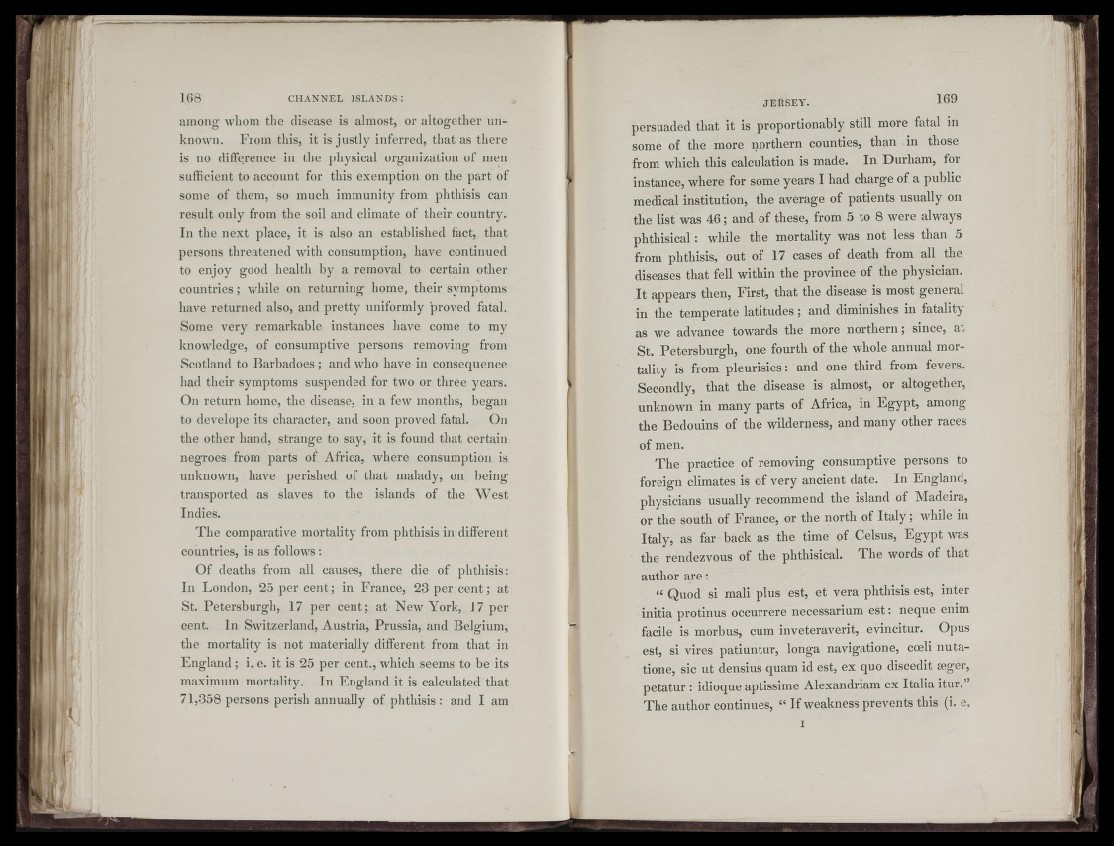
1G8 CHANNEL i s l a n d s :
among- whom the disease is almost, or altogether unknown.
From this, it is justly inferred, that as there
is no difference in the physical organization of men
sufficient to account for this exemption on the part of
some of them, so much immunity from phthisis can
result only from the soil and climate of their countrjL
In the next place, it is also an established fact, that
persons threatened with consumption, have continued
to enjoy good health by a removal to certain other
countries; while on returning home, their symptoms
have returned also, and pretty uniformly proved fatal.
Some very remarkable instances have come to my
knowledge, of consumptive persons removing from
Scotland to Barbadoes ; and who have in consequence
had tlieir symptoms suspended for two or three years.
On return home, the disease, in a few months, began
to develope its character, and soon proved fatal. On
the other hand, strange to say, it is found tliat certain
negroes from parts of Africa, where consumption is
unknown, have perished of that malady, on being-
transported as slaves to the islands of the West
Indies.
The comparative mortality from phthisis in different
countries, is as follows ;
Of deaths from all causes, there die of phthisis:
In London, 25 per cent; in France, 23 per cent; at
St. Petersburgh, 17 per cent; at New York, 17 per
cent. In Switzerland, Austria, Prussia, and Belgium,
the mortality is not materially different from that in
England; i. e. it is 25 per cent., which seems to be its
maximum mortality. In England it is calculated that
71,358 persons perish annually of phthisis: and I am
persuaded that it is proportionably still more fatal in
some of the more northern counties, than in those
from which this calculation is made. In Durham, for
instance, where for some years I had charge of a public
medical institution, the average of patients usually on
the list was 46; and of these, from 5 to 8 were always
phthisical: while the mortality was not less than 5
from phthisis, out of 17 cases of death from all the
diseases that fell within the province of the physician.
It appears then. First, that the disease is most general
in the temperate latitudes; and diminishes in fatality
as we advance towards the more northern; since, at
St. Petersburgh, one fourth of the whole annual mortality
is from pleurisies: and one third from fevers.
Secondly, that the disease is almost, or altogether,
unknown in many parts of Africa, in Egypt, among
the Bedouins of the wilderness, and many other races
of men.
The practice of removing consumptive persons to
foreign climates is of very ancient date. In England,
physicians usually recommend the island of Madeira,
or the south of France, or the north of Ita ly ; while in
Italy, as far back as the time of Celsus, Egypt Avas
the rendezvous of the phthisical. The words of that
author a re :
“ Quod si mali plus est, et vera phthisis est, inter
initia protinus occurrere necessarium e s t: neque enim
facile is morbus, cum inveteraverit, evincitur. Opus
est, si vires patiuntur, longa navigation e, cceli nuta-
tione, sic ut densius quam id est, ex quo discedit a 3 g e r ,
petatur : idioque aptissime Alexandriam ex Italia itur.”
The author continues, “ If weakness prevents this (i. e.
n v* ir -1J
1
i
im